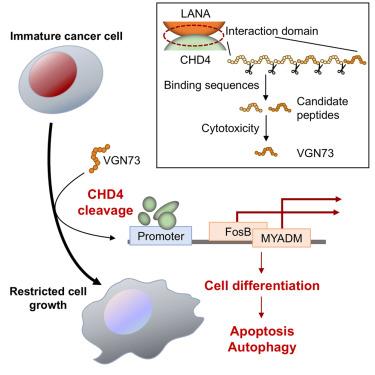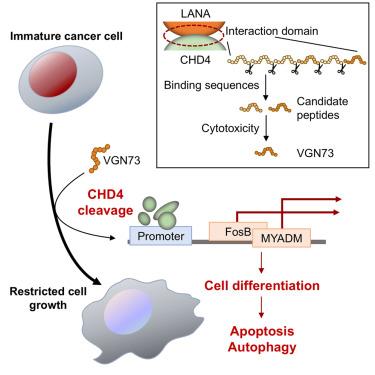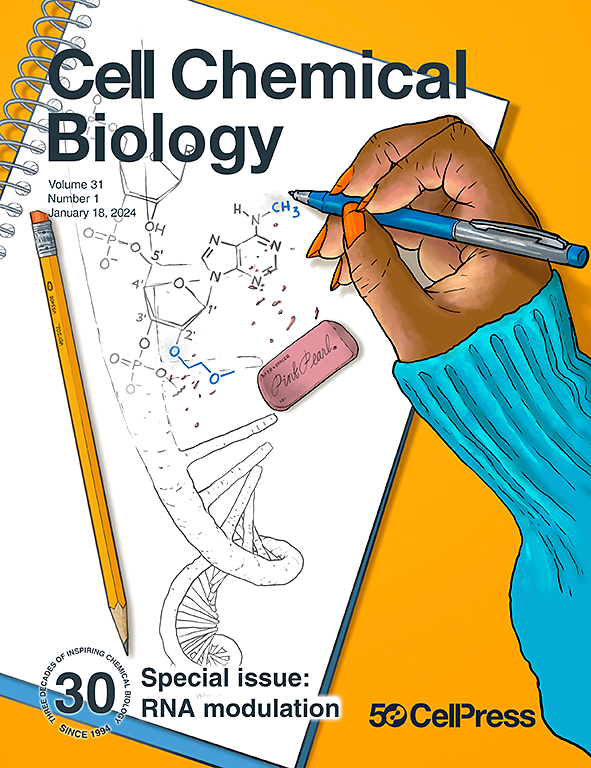A LANA peptide inhibits tumor growth by inducing CHD4 protein cleavage and triggers cell death
IF 6.6
1区 生物学
Q1 BIOCHEMISTRY & MOLECULAR BIOLOGY
引用次数: 0
Abstract
Kaposi’s sarcoma-associated herpesvirus (KSHV) establishes a latent infection, and viral genes are poised to be transcribed in the latent chromatin. In the poised chromatins, KSHV latency-associated nuclear antigen (LANA) interacts with cellular chromodomain-helicase-DNA-binding protein 4 (CHD4) and inhibits viral promoter activation. CHD4 is known to regulate cell differentiation by preventing enhancers from activating promoters. Here, we identified a putative CHD4 inhibitor peptide (VGN73) from the LANA sequence corresponding to the LANA-CHD4 interaction surface. The VGN73 interacts with CHD4 at its PHD domain with a dissociation constant (KD) of 14 nM. Pre-treatment with VGN73 enhanced monocyte differentiation into macrophages and globally altered the repertoire of activated genes in U937 cells. Furthermore, the introduction of the peptide into the cancer cells induced caspase-mediated CHD4 cleavage, triggered cell death, and inhibited tumor growth in a xenograft mouse model. The VGN73 may facilitate cell differentiation therapy.


LANA 肽通过诱导 CHD4 蛋白裂解和引发细胞死亡来抑制肿瘤生长
卡波西肉瘤相关疱疹病毒(KSHV)会形成潜伏感染,病毒基因在潜伏染色质中准备转录。在潜伏染色质中,KSHV 潜伏相关核抗原(LANA)与细胞染色质链-螺旋酶-DNA 结合蛋白 4(CHD4)相互作用,抑制病毒启动子的激活。众所周知,CHD4 通过阻止增强子激活启动子来调节细胞分化。在这里,我们从与 LANA-CHD4 相互作用表面相对应的 LANA 序列中鉴定出了一种推定的 CHD4 抑制肽(VGN73)。VGN73 与 CHD4 的 PHD 结构域相互作用,其解离常数 (KD) 为 14 nM。用 VGN73 预处理可促进单核细胞分化为巨噬细胞,并全面改变 U937 细胞中的活化基因。此外,在异种移植小鼠模型中,将该肽引入癌细胞可诱导Caspase介导的CHD4裂解,引发细胞死亡并抑制肿瘤生长。VGN73 可促进细胞分化疗法。
本文章由计算机程序翻译,如有差异,请以英文原文为准。
求助全文
约1分钟内获得全文
求助全文
来源期刊

Cell Chemical Biology
Biochemistry, Genetics and Molecular Biology-Molecular Medicine
CiteScore
14.70
自引率
2.30%
发文量
143
期刊介绍:
Cell Chemical Biology, a Cell Press journal established in 1994 as Chemistry & Biology, focuses on publishing crucial advances in chemical biology research with broad appeal to our diverse community, spanning basic scientists to clinicians. Pioneering investigations at the chemistry-biology interface, the journal fosters collaboration between these disciplines. We encourage submissions providing significant conceptual advancements of broad interest across chemical, biological, clinical, and related fields. Particularly sought are articles utilizing chemical tools to perturb, visualize, and measure biological systems, offering unique insights into molecular mechanisms, disease biology, and therapeutics.
 求助内容:
求助内容: 应助结果提醒方式:
应助结果提醒方式:


